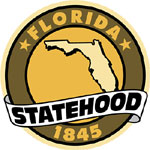ABOUT Florida
Capital: Tallahassee
State abbreviation/Postal code: Fla./FL
Nickname: Sunshine State
Origin of name: Named on Easter 1513 by Ponce de Leon for Pascua Florida, meaning "Flowery Easter".
Briefs on Florida:
 Florida can well be called a land of beaches. Located in southeastern United States, the climate of this state is one of the best in the country and therefore ideal for tourist activities all round the year. Florida takes pride in presenting some of the best American beaches spreading around its extensive coastline. The place is ideal for all the aqua lovers and those seeking to relish water sports. Along with beaches and water sports Florida is also known for its enticing wildlife and hi-tech theme parks. The wildlife is found in and on its famous wetlands and along its shoresc.
Florida can well be called a land of beaches. Located in southeastern United States, the climate of this state is one of the best in the country and therefore ideal for tourist activities all round the year. Florida takes pride in presenting some of the best American beaches spreading around its extensive coastline. The place is ideal for all the aqua lovers and those seeking to relish water sports. Along with beaches and water sports Florida is also known for its enticing wildlife and hi-tech theme parks. The wildlife is found in and on its famous wetlands and along its shoresc.
Covering an area of 170, 451 square kilometers and inhabiting a huge population of 15,982,378 approximately, Florida is situated mostly on a large peninsula between the Gulf of Mexico, the Atlantic Ocean and the Straits of Florida. North of Florida is bordered by states of Georgia and to the west is Alabama. Florida lies close to the countries of Caribbean especially Bahamas and Cuba.
 Florida is quite an old state. The archaeological finds tell the tale of Florida?s past. The state was inhabited for thousands of years before any European settlements. The prominent tribes amongst these were Ais, Calusa, Tequesta, Timucua and the Tocobago. The land of Florida was discovered on 2nd April 1513. Its discoverer was a Spanish conquistador named Juan Ponce de Leon. Juan found this land during the Pascua Florida, which is a Spanish term for the Easter season. From that day onwards this place was titled as "La Florida".
Florida is quite an old state. The archaeological finds tell the tale of Florida?s past. The state was inhabited for thousands of years before any European settlements. The prominent tribes amongst these were Ais, Calusa, Tequesta, Timucua and the Tocobago. The land of Florida was discovered on 2nd April 1513. Its discoverer was a Spanish conquistador named Juan Ponce de Leon. Juan found this land during the Pascua Florida, which is a Spanish term for the Easter season. From that day onwards this place was titled as "La Florida".
In the years that followed Florida witnessed Spanish and French settlements. In 1559 Don Tristan de Luna y Arellano established the Spanish Pensacola as the first European settlement in the continental united states. But the settlement got aborted two years (in 1561) and was re-inhabited in 1690.
Meanwhile in 1564 French Huguenots founded Fort Caroline in what is now known as the Jacksonville. But in the next year only the forces from new Spanish colony of St. Augustine conquered the fort. However the Spaniards never succeeded in establishing a strong hold over Florida. They only had a tenuous control of the region by converting the local tribes, briefly with Jesuits and later with Franciscan friars.
Over the years the frequent establishment of the brutish colonies to the north and the French colonies led to the reduction in the area of Florida. The English officers wrecked the Spanish power in the region by supplying their Creek Indian allies with firearms and asking them to raid the Timucuan and Apalachee client tribes of the Spanish.
The English people also attacked St. Augustine and ruined his cathedral. In 1763 Great Britain captured the entire Florida. This was due to the Treaty of Paris signed in 1763. Though England tied its best to develop Florida through various means but it could not succeed.
In 1783 the Second Treaty of Paris was signed. This treaty formally ended the American Revolutionary War between the Kingdom of Great Britain and the Thirteen Colonies in North America that had opposed the British rule in 1776. As a result of this treaty and defeat of the American colonies Spain regained control of Florida. In 1891 with acceptance of the Adams-Onis Treaty Spain gave way Florida to United States of America. On 3rd march 1845 Florida became the 27th state of United States of America.
More links about Florida